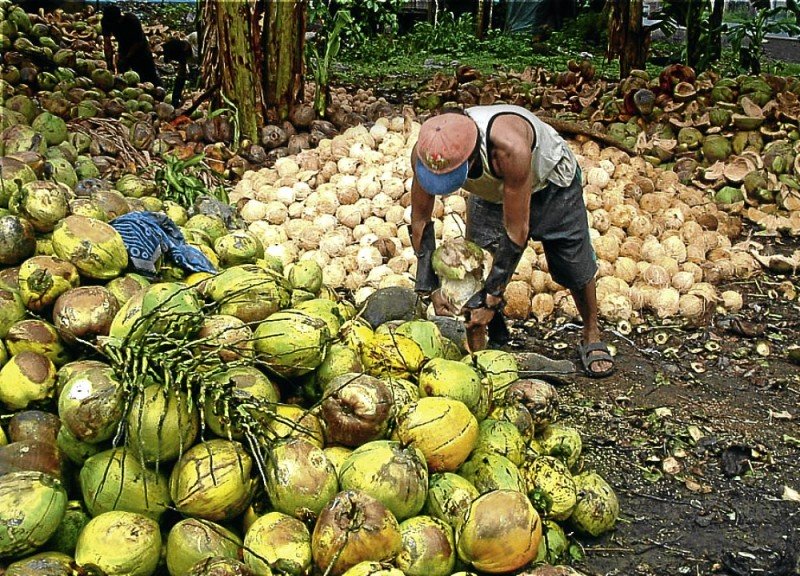The search for cure or relief from the deadly novel coronavirus may lead to a Philippine product that has inspired many health claims—the coconut.
The Department of Science and Technology (DOST) said on Friday (Feb. 7) that it was investigating the potential of virgin coconut oil, or VCO, as a virus buster.
After the ceremonial signing of the implementing rules and regulations (IRR) of the Philippine Innovation Act, or Republic Act (RA) No. 11293, Science and Technology Secretary Fortunato T. dela Pena said the new law will encourage more research and development (R&D) given a P1-billion revolving fund to support startups and innovative micro, small and medium enterprises (MSMEs).
Socioeconomic Planning Secretary Ernesto M. Pernia said currently, government spending on R&D was a mere 0.15 percent of gross domestic product (GDP), compared with 1 percent of GDP in Singapore and close to 1 percent in Indonesia, Malaysia and Thailand.
“Our R&D in the Philippines is like in 1991 or 1995 compared to Singapore,” said Pernia, who heads the state planning agency National Economic and Development Authority (Neda).
Pernia said the government wanted to push up expenditures on R&D also to 1 percent, similar to other countries in Southeast Asia.
Asked if it can also be done for nCoV, Dela Peña noted that the virus was relatively new.
“If you will start only now the clinical trials, it will not really be timely for this particular occurrence—it will be long-term,” Dela Pena said.
“And besides, it will be very difficult to find the afflicted persons for whom we will conduct the clinical trials,” he said.
Dela Peña nonetheless disclosed that government scientists were “trying to explore the possibility of building on what some are claiming as health supplements because it may help, but not yet as drugs.”
He said a claim that VCO can help is “something that we should look at.” The claim was made by Fabian Antonio M. Dayrit, professor emeritus of Ateneo de Manila University.
Last Jan. 31, the Ateneo School of Science and Engineering posted on its website the study of Dayrit and Dr. Mary Newport, of Spring Hill Neonatology Inc., entitled “The Potential of Coconut Oil and its Derivatives as Effective and Safe Antiviral Agents Against the Novel Coronavirus.”
The study was written as nCoV outbreaks were reported across China and jumped borders to other countries.
“Several researchers have been designing drugs to specifically target protease enzymes in coronavirus, but testing for these drugs is many months away,” said the paper.
“What if there is a treatment candidate against the coronavirus that might already be available and whose safety is already established?” Dayrit and Newport said.
Agents found in VCO, like lauric acid and its derivative monolaurin, “have been known for many years to have significant antiviral activity,” said the paper.
Lauric acid, it said, is “a medium-chain fatty acid which makes up about 50 percent of coconut oil.”
“Monolaurin is a metabolite that is naturally produced by the body’s own enzymes upon ingestion of coconut oil and is also available in pure form as a supplement,” the study said.
Other substances found in coconut oil, like sodium lauryl sulfate, have also been “shown to have potent antiviral properties.”
Lauric acid, monolaurin and sodium lauryl sulfate “are used in a wide range of products for their antiviral properties,” the study added.
Dayrit and Newport said lauric acid and monolaurin had been found to be anti-viral as they blast away at the virus envelope, can prevent late maturation of viruses and “prevent the binding of viral proteins to the host cell membrane.”
“Coconut oil and its derivatives have been shown to be safe and effective antiviral compounds in both humans and animals,” the study said.
Several lab animal and human studies “support the potential of coconut oil, lauric acid and its derivatives as effective and safe agents against a virus like nCoV,” it continued.
“Mechanistic studies on other viruses show that at least three mechanisms may be operating,” the study said.
“Given the considerable scientific evidence for the antiviral activity of coconut oil, lauric acid and its derivatives and their general safety, and the absence of a cure for nCoV, we urge that clinical studies be conducted among patients who have been infected with nCoV,” it said.
“This treatment is affordable and virtually risk-free, and the potential benefits are enormous,” the two scientists added.
They said “given the safety and broad availability of virgin coconut oil, we recommend that VCO be considered as a general prophylactic (preventive agent) against viral and microbial infection,” they said.
